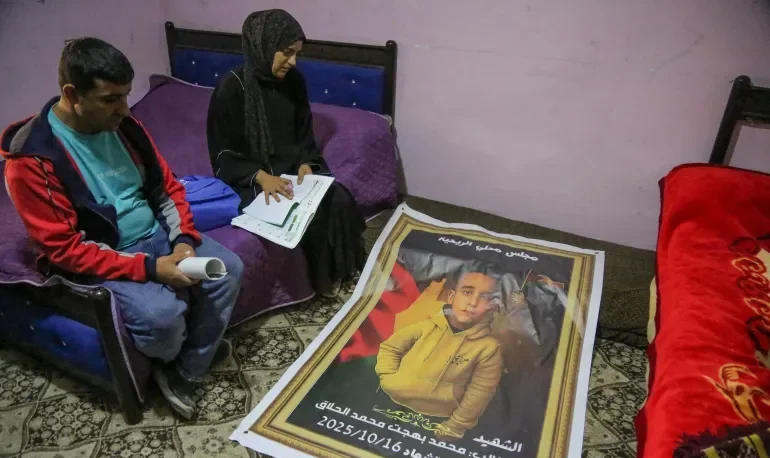ON the morning of October 16, nine-year-old Muhammad al-Hallaq woke up for another day in his small village south of Hebron.
His mother, Alia, prepared his clothes and breakfast, and packed three extra slices of pizza for him to share with his friends, just like he’d asked.
Muhammad came back from school with a new backpack and put his books and notepads inside it, excited to take it to school after the weekend. He ate a bit of food and then went out to watch the birds, as he liked to do.
A child, excited by the simple things, and curious about the world around him.
Muhammad came home, messed around with some olives, and then went out again to play football. This time, the fourth-grader didn’t come back.
At the grocery store, Alia received a phone call.
“It was my uncle Ahmad calling, asking if there were any clashes [with Israeli forces] in our area,” she recounted. “I screamed unconsciously. ‘My son Muhammad, my son Muhammad!’ I don’t know why, but a mother’s instincts are always right.”
Muhammad’s eldest sister, 14-year-old Mais, heard the gunfire in the evening and rushed outside.
Both Mais and Alia were originally told their boy had been injured.
Alia headed for the local hospital and was told that her boy had been hit by a bullet.
“They said his condition was good and that they would remove the bullet,” Alia said. But then she started hearing whispers about his pulse stopping. She wanted to see Muhammad, but wasn’t allowed in the operating theatre, as surgeons desperately tried to save the boy’s life.
Then Alia heard the heart monitor give a long, piercing beep. Muhammad was dead, killed by Israeli forces operating in his village.
“Muhammad was gone,” Alia said. “And with him, everything good.”
Commenting on Muhammad’s killing by Israeli forces, the United Nations Human Rights Office in the occupied Palestinian territory said it was “appalled”. The UN office added that Muhammed was the 1,001st Palestinian to be killed by Israeli forces or settlers in the occupied West Bank since October 7, 2023, including 213 children.
The UN said that the youngest child killed by Israeli forces in the West Bank was two-year-old Laila Khatib, who was shot in her home in Jenin in January during an Israeli raid.
“International standards require Israel to ensure an independent and effective investigation of all incidents where individuals have been killed in violent or suspicious circumstances,” the UN office said.
“The large numbers of Palestinians killed in this period, the prevalence of the unlawful use of force, the enabling and support for settler violence and the endemic impunity for crimes committed against Palestinians, all suggest that Israeli [forces] use lethal and potentially lethal force as a tool to control and repress Palestinians, rather than as the last resort to restore and maintain public order and civil life for the Palestinians.”
Muhammad and his friends are believed to have run when they saw Israeli military vehicles in their vicinity, before Israeli soldiers began shooting.
An initial statement from the Israeli military said that its forces were responding to suspects throwing rocks – although no local reports indicate that had happened, or that Muhammad and his friends were involved. Israeli media have since reported that a preliminary military investigation had found that the shooting “deviated from the rules of engagement”, and that there had been “improper use of weaponry”.







